2020秋新教材高中英语Unit5LanguagesaroundtheworldSectionⅡ提能作业含解析人教版必修一
英语课件(新教材新高考人教版)Unit5LanguagesAroundtheWorld

n.指称关系;参考 vi.提到;参考;查阅 vt.查询;叫……求助于 adj.以(某事)为基础的;以……为重要部分 (或特征)的 vt.以……为基础 n.底部;根据 n.基础 adj.基础的
3
variety
→vary
→various
4
major
→majority
5
globБайду номын сангаасl
→globe
n.(植物、语言等的)变体;异体;多样化 v.变化;不同 adj.各种各样的 adj.主要的;重要的;大的 n.主修课程; 主修学生 vi.主修;专门研究 n.大多数 adj.全球的;全世界的 n.地球;地球仪
7 arbitrary 8 assess
adj.任意的;武断的 vt.评定;估价
Ⅳ.背核心短语
1 refer to 2 ups and downs 3 date back (to...) 4 point of view 5 relate to 6 be known for 7 at the beginning
(1)On the basis (base) of what you show,I firmly believe that you can be qualified for the position. (2)队员们需要每天放学后接受训练,他们也有机会定期观摩乒乓球赛。 Team members need to receive training after school every day and they ______________________________________________________________ regular basis . (3)我写信告知你一些基本的餐桌礼仪。基于中国的传统风俗,你应该 先让长者用餐。(应用文写作之告知信) I am writing to inform you of some basic table manners .___B_a_s_e_d_o_n___ traditional Chinese customs ,you should let the elderly eat first.
2020 人教unit 5LANGUAGES AROUND THE WORLD
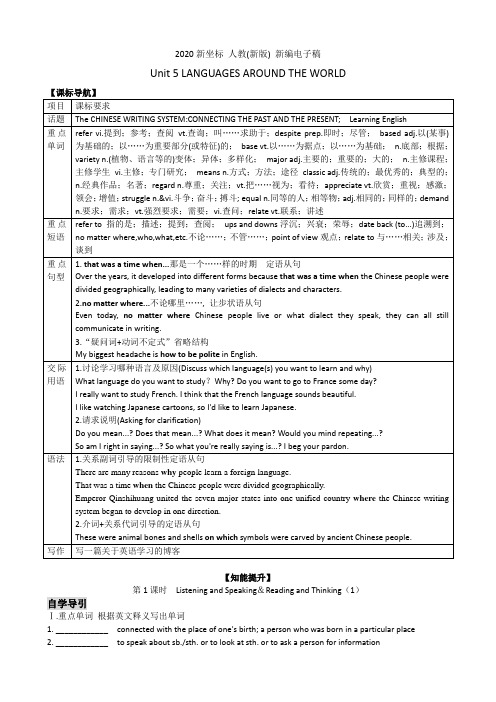
2020新坐标人教(新版) 新编电子稿Unit 5 LANGUAGES AROUND THE WORLD【课标导航】【知能提升】第1课时Listening and Speaking&Reading and Thinking(1)自学导引Ⅰ.重点单词根据英文释义写出单词1. ____________ connected with the place of one's birth; a person who was born in a particular place2. ____________ to speak about sb./sth. or to look at sth. or to ask a person for information3. ____________ to use a city, town, etc as the main place for sth.; the lowest part of sth.4. ____________ to make objests by cutting away material from wood or stone5. ____________ some different kinds of the same thing6. ____________ to study sth. as the main subject at a university or college; very large or important7. ____________ the form of a language spoken in one area with different forms of the same language8. ____________ traditional in style or design; not affected by the changes in fashion9. ____________ to think about sb./sth. in a particular way10. ____________ to recognize the good qualities of sb./sth.; to be thankful for sb./sth.答案:1. native ;2. refer;3. base;4. carve;5. variety;6. major;7. dialect;8. classic;9. regard;10. appreciate;Ⅱ.重点短语1. refer _____ 指的是;描述;提到;查阅2. ups and _____浮沉;兴衰;荣辱;3. date _____ (to...)追溯到;4. no __________ where不论哪里;不管何处;5. __________... nor....既不……,也不……6. be of great __________ 非常重要7. _____ number of 许多;大量8. not only... _____ also...不仅……而且……答案:1. to; 2. downs; 3. back 4. matter 5. neither 6. importance 7. a 8. but互动探究Ⅰ.研究课文的篇章结构并填表Ⅱ.理解课文关键信息,回答问题1. Where were the earliest Chinese characters carved?A. On stones.B. On paper.C. On bones.D. On pictures2. Why did the Chinese writing system once have different forms?A. Because there were many dialects and character.B. Because China at that time was divided into several states.C. Because the writing system was developed well in the Shang Dynasty.D. Because Qingshihuang was not born then.3. When was the Chinese writing system developed in one direction?A. During the Shang Dynasty.B. During the Qing Dynasty.C. Several thousand years ago.D. In the modern times.4. Which statement is wrong about the Chinese calligraphy?A. It is an important art form.B. It is one important part of Chinese culture.C. It is written with Chinese characters.D. It begins from the modern times.5. Why more and more international students begin to be interested in China's culture?A. Because China plays a more important role in the world than before.B. Because China has the oldest writing system in the world.C. Because hanzi is a picture-based language at the beginning.D. Because China went through too many ups and downs in its history.答案:1-5:CBBDA拓展训练完成下面的课文精华缩写并熟练背诵As one of the most ancient Chinese civilisations, the Chinese writing system 1.dates (date) back several thousand years to Longgu (animals bones and shells) on 2. which symbols were carved by ancient Chinese people. By the Shang Dynasty, these symbols 3. had become (become) a well-developed system, and it later developed into different forms. During the Qin Dynasty, Qingshihuang, 4. an emperor, not only 5. united (unit) the seven major states into one country, but also united the writing system. So today, people in different areas of China can communicate 6. in writing. Chinese also develop Chinese 7. characters (character) into Chinese calligraphy, which is an important part of Chinese culture. As China plays a 8. greater (great) role in global affairs, an 9. increasing (increase) number of international students begin 10. to appreciate (appreciate) China's culture and history through this language.第2课时Listening and Speaking&Reading and Thinking(2)自学导引Ⅰ.品句填词根据汉提示并结合句意填出适当的英语单词1. As we all know, a positive __________ (态度) is the key to success.2. The survival of civilization depends on many environmental __________ (因素).3. He thinks to read the original work is better than to see the film __________ (以……为基础) on it.4. The statue was __________ (雕刻) out of a single block of stone.5. He is in good shape as a result of the __________ (多样性) in the diet with different nutrition..6. Li Ming, a graduate from Peking University, __________ (主修) in computer software design.7. Nowadays we have a great number of __________ (途径) of getting information.8. Dickens' A Tale of Two Cities is a literary __________ (名著).9. We __________ (把……视为) him as one of the best players in this game.10. The teacher taught us how to __________ (欣赏) classic literature.答案:1. attitude 2. factors 3. based 4. carved 5. variety 6. majors 7. means 8. classic 9. regarded 10. appreciate Ⅱ.短语运用1. People who work in offices are frequently _______ ______ (指的是) as 'white-collar workers' .2. Just like everyone, I have experienced____ _____ ____ (浮沉) in my life.3. His first book to be published next month ___ ______ ____ (以……为基础) a true story.4. In China, needle treatment ____ ______ ___ (追随到) ancient times.5. Society is made up of __ _______ ____(各种各样的) people; some are good, others bad, and still others in between.6. ___ ______ ____(不论什么) difficulties you get into, do not give up.答案:1.referred to 2. ups and downs 3.is based on 4.dates back to 5. a variety of 6.no matter what互动探究要点1【原句】Pronouns (it, their, she, etc) refer to something or somebody mentioned earlier. (P60)代词(它,它们的,她,等等)指的是前面提到的物或人。
Unit5Languagesaroundtheworld必背清单-高中英语人教版
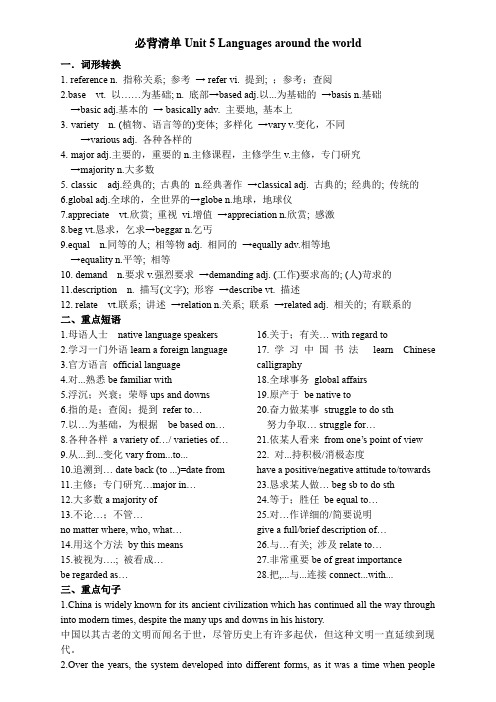
必背清单Unit 5 Languages around the world一.词形转换1. reference n. 指称关系; 参考→ refer vi. 提到; ;参考;查阅2.base vt. 以……为基础; n. 底部→based adj.以...为基础的→basis n.基础→basic adj.基本的→ basically adv. 主要地, 基本上3.variety n. (植物、语言等的)变体; 多样化→vary v.变化,不同→various adj. 各种各样的4.major adj.主要的,重要的n.主修课程,主修学生v.主修,专门研究→majority n.大多数5.classic adj.经典的; 古典的n.经典著作→classical adj. 古典的; 经典的; 传统的6.global adj.全球的,全世界的→globe n.地球,地球仪7.appreciate vt.欣赏; 重视vi.增值→appreciation n.欣赏; 感激8.beg vt.恳求,乞求→beggar n.乞丐9.equal n.同等的人; 相等物adj. 相同的→equally adv.相等地→equality n.平等; 相等10. demand n.要求v.强烈要求→demanding adj. (工作)要求高的; (人)苛求的11.description n. 描写(文字); 形容→describe vt. 描述12. relate vt.联系; 讲述→relation n.关系; 联系→related adj. 相关的; 有联系的二、重点短语1.母语人士native language speakers2.学习一门外语learn a foreign language3.官方语言official language4.对...熟悉be familiar with5.浮沉;兴衰;荣辱ups and downs6.指的是;查阅;提到refer to…7.以…为基础,为根据be based on…8.各种各样a variety of…/ varieties of…9.从...到...变化vary from...to...10.追溯到… date back (to ...)=date from11.主修;专门研究…major in…12.大多数a majority of13.不论…;不管…no matter where, who, what…14.用这个方法by this means15.被视为….; 被看成…be regarded as…16.关于;有关… with regard to17.学习中国书法learn Chinese calligraphy18.全球事务global affairs19.原产于be native to20.奋力做某事struggle to do sth努力争取… struggle for…21.依某人看来from one’s point of view22. 对...持积极/消极态度have a positive/negative attitude to/towards23.恳求某人做… beg sb to do sth24.等于;胜任be equal to…25.对…作详细的/简要说明give a full/brief description of…26.与…有关; 涉及relate to…27.非常重要be of great importance28.把,...与...连接connect...with...三、重点句子1.China is widely known for its ancient civilization which has continued all the way through into modern times, despite the many ups and downs in his history.中国以其古老的文明而闻名于世,尽管历史上有许多起伏,但这种文明一直延续到现代。
2019_2020学年新教材高中英语Unit5LanguagesaroundtheworldSectionⅠListeningandSpeaking

Unit 5 Languages around the world英语是一种使用很广泛的语言,英语的历史真正起源于公元5世纪。
The history of the English language reallystarted when other people arrived in England duringthe 5th century.Old EnglishThe invading Germans spoke similar languages,which in Britain developed into what we now call Old English.Old English didn't sound or look like English today.Native English speakers now would have great difficulty understanding Old English.However,about half of the most commonly used words in Modern English have Old English roots.Middle EnglishIn 1066,the Norman invaded and conquered England.They also brought with them a kind of French,which became the language of the ruling and business classes.For a period,the lower classes spoke English and the upper classes spoke French.In the 14th century,English became dominant(占优势的) in Britain again,with many French words added.This language is called Middle English.Late Modern EnglishThe main difference between Early Modern English and Late Modern English is te ModernEnglish has many more words,resulting from two main factors:firstly,technology development created a need for new words;secondly,the British Empire at its height covered one quarter of the earth's surface,and the English language used foreign words from many countries.Now there are many other varieties of English in the world,such as Australian English,New Zealand English,Canadian English,South African English,Indian English and Caribbean English.[阅读障碍词]1.invade vt.&vi.侵入,侵略2.root n.根,根源v.生根3.upper adj.地位较高的,上面的4.factor n.因素5.variety n.多样,种类,多样化[诱思导读]阅读短文,回答问题1.What is the main idea of the text?____________________________________________________________________________________________________________2.What's the main difference between Early Modern English and Late Modern English? ____________________________________________________________________________________________________________[答案] 1.The history of the English language.2.Vocabulary.Section ⅠListening and Speaking & Reading and Thinking——ComprehendingⅠ.匹配下列单词的词性及汉语意思( )1.native A.vt.以……为据点;以……为基础n.底部;根据( )2.attitude B.n.(植物、语言等的)变体;异体;多样化( )3.base C.n.符号;象征( )4.symbol D.adj.出生地的;本地的;土著的n.本地人( )5.variety E.vt.欣赏;重视;感激;领会vi.增值( )6.classic F.n.方式;方法;途径( )7.character G.n.态度;看法( )8.appreciate H.adj.传统的;最优秀的;典型的n.经典作品;名著( )9.dynasty I.n.文字;符号;角色;品质;特点( )10.means J.n.王朝;朝代[答案] 1-5 DGACB 6-10 HIEJFⅡ.选择下列句中词语的汉语意思(in the exam.( )2.We go through ups and downs together!( )3.In addition,you should pay attention to protecting the environment.( )4.As is known to us,the West Lake is known for its beauty.( )5.Which door leads to the yard?( )6.It is well known that lung cancer is connected with smoking.[答案] 1-6 FBCEDA第一步速读——了解文章主题和段落大意速读P62课文内容,选择最佳答案/匹配段落大意1.What is the text mainly about?A.The development of Chinese writing system.B.The effect of Chinese writing system.C.The important role of Chinese writing system.D.The development and effect of Chinese writing system.[答案] D2.Paragraphs 1-4 A.China's present is connected withits past by written Chinese.3.Paragraph 5 B.Many foreigners learn Chineseculture and history through theChinese written system.4.Paragraph 6 C.How did the Chinese writingsystem develop.[答案] 2-4 CAB第二步细读——把控文章关键信息细读P62课文内容,选择最佳答案1.What do you think is one of the main factors that has helped the Chinese language and culture survive?A.Chinese writing system.B.Chinese wisdom.C.Chinese hard work.D.Chinese spoken language.2.What is the main idea of Paragraph 2?A.How did people carve symbols on bones and shells.B.What did the symbols on bones and shells mean.C.When did the picturebased language begin.D.A picturebased language,the earliest written Chinese.3.Why did the Chinese writing system begin to develop in one direction?A.People wanted to live in peace.B.Emperor Qinshihuang united the seven major states into one unified country.C.People were willing to communicate in a language.D.People were divided geographically.4.What does foreigners appreciate the China's culture and history?A.Classic works.B.Music.C.The Chinese language.D.A picturebased language.[答案] 1-4 ADBC第三步研读——能力升华接轨高考根据P62课文内容,在空白处填入1个适当的单词或括号内单词的正确形式。
高中英语 Unit 5 Languages Around The World
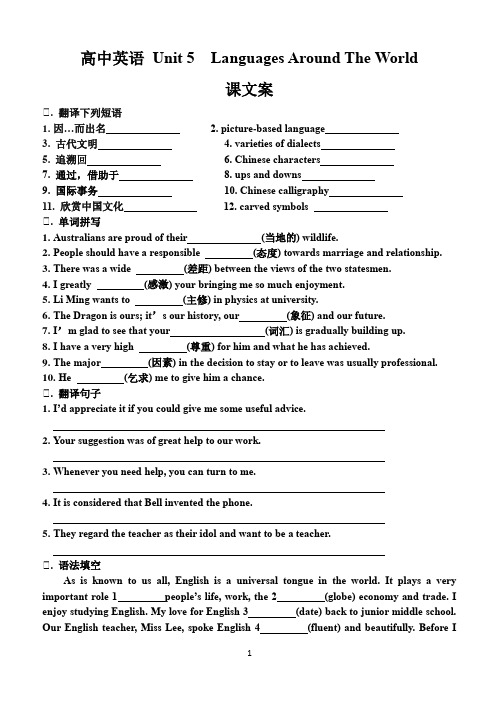
高中英语Unit 5 Languages Around The World课文案2. picture-based language4. varieties of dialects6. Chinese characters7. 通过,借助于8. ups and downs10. Chinese calligraphy12. carved symbolsⅠ. 单词拼写1.Australians are proud of their (当地的) wildlife.2.People should have a responsible (态度) towards marriage and relationship.3.There was a wide (差距) between the views of the two statesmen.4.I greatly (感激) your bringing me so much enjoyment.5.Li Ming wants to (主修) in physics at university.6.The Dragon is ours; it’s our history, our (象征) and our future.7.I’m glad to see that your (词汇) is gradually building up.8.I have a very high (尊重) for him and what he has achieved.9.The major (因素) in the decision to stay or to leave was usually professional.10.He (乞求) me to give him a chance.Ⅰ. 翻译句子1.I’d appreciate it if you could give me some useful advice.2.Your suggestion was of great help to our work.3.Whenever you need help, you can turn to me.4.It is considered that Bell invented the phone.5.They regard the teacher as their idol and want to be a teacher.Ⅰ. 语法填空As is known to us all, English is a universal tongue in the world. It plays a very important role 1 people’s life, work, the 2 (globe) economy and trade. I enjoy studying English. My love for English 3 (date) back to junior middle school. Our English teacher, Miss Lee, spoke English 4 (fluent) and beautifully. Before Imet Miss Lee, studying English was a struggle for me. Because of her perfect English, I5 (fall) in love with the language. Miss Lee6 (regard) us as excellent students and even encouraged us to read the simple version of those7 (classic) written in English. She sometimes taught us how8 (appreciate) English poems. 9 some difficulties, I never gave up studying English. I’m now in Senior One in a high school and have a specific goal that I will work as a translator. I plan 10 (major) in English when I go to university.Ⅴ. 阅读理解One of the most enjoyable experiences you can have is to learn another language. In the United States, more and more people speak Spanish. Learning Spanish may be a great way for you to communicate with new people. Perhaps it can even help you with your business! There are many reasons to learn Spanish. But how will you do it?Many high-schoolers and even middle-schoolers have learned a new language, so it’s quite necessary for us adults to learn a foreign language. Have you taken a class to learn Spanish? Perhaps you haven’t, but you still want to learn. What can you do? There are many ways you can learn Spanish. Now we are not talking about learning it from someone you don’t know in the street! Learning Spanish can be fun and shouldn’t be viewed as a punishment. Okay, so where do you begin to look to learn Spanish? Here’s one website that can help you. It’s the Learn Spanish Resource Site. You can learn Spanish online through one of the many Spanish teaching websites. Not for you? Another choice of learning Spanish is to check if there is anything available at your local college or even local library. Still want more options on how to learn Spanish? Y ou can always check out the tapes and videos that can help you learn slowly.Learning Spanish can do more for you than just allowing you to communicate with new people. Providing Spanish language on your website can help you attract new customers. You can also learn quite a bit about the culture, the traditions, and the history of those countries that speak that language.1.The passage is most probably written for .A.teachersB. businessmenC. pupilsD. travelers2.The reasons to learn Spanish mentioned in the passage are the following ones EXPECT .A.learning Spanish may be a great way to communicate with new peopleB.learning Spanish because it is the best language in the worldC.learning Spanish can help you with your businessD.learning Spanish can also help you learn quite a bit about the culture, the traditions, and the history of those countries that speak that language3.Which of the following ways for learning Spanish does the author not suggest in the passage?A.Learn Spanish online on a Spanish teaching website.B.Go to the local college to find some reference books.C.Go to buy some tapes and videos about Spanish learning.D.Go and find some other Spanish learners to learn with.4.In the author’s opinion, learning a foreign language .A.requires a lot of timeB.is not as easy as people thinkC.can give us much pleasureD.is a painful experienceⅠ. 阅读七选五You might dream of fluency in this or that language, and maybe you have already achieved fluency in a foreign language. ____5____Fluency, like all abstract terms(术语),has no universal meaning. Each individual must determine what the term means. ____6____Perfect fluency means knowing every word you come across, speaking quickly, clearly and easily and having no accent. ____7____ You aren’t familiar with every word of your native language, and sometimes you have to search for the right word, even in your mother tongue.Quick fluency is the type of fluency you see in advertisements, because “Master a Language in 2 Months!” sounds more attractive and pleasing than “Fluency in 20 Years!” ____8____ It is possible to achieve quick fluency, but the fluency achieved after such a short period of time will be a very superficial fluency.___9____ Native-like fluency means that you generally know all the same words that a native knows and can speak at the same pace with the same amount of ease as a native speaker. You will likely have an accent, but as long as your conversation partner can understand you, it doesn’t matter.There are a ton of other things that fluency could potentially be, but that’s up to you to figure out.A.It sounds too good to be true.B.However, nobody is “perfectly fluent ” in any language.C.Quick fluency is good if you have some sort of deadline.D.But have you ever considered what fluency really means?E.But does fluency have the same meaning to other persons as it does to you?F.Unlike perfect fluency, native-like fluency is a reasonable and achievable goal.G.To assist you in determining what fluency is, I’ll describe a few different types of fluency.Ⅶ. 完形填空How do young people learn best? This is something I think a lot when I am teaching foreign languages to young people. I often find that traditional teaching ___10___ arehardly effective for young brains to learn a foreign language.After moving to southern Italy, I was ___11___ to have had the chance to run a private course teaching English to children under seven. I ___12___ children liked singing and enjoyed games so I wanted to use these ___13___ to help my students develop English conversation skills. I found some fun and ___14___ songs online, which they loved very much. I also found the English version of some nursery rhymes(童谣) they once were ___15___ with. All of them were very entertaining and helpful but ___16___ could still not have a basic ___17___ in English.I wanted these students to be ___18___ in the language I was teaching and I also wished them to speak it. I was eager to deliver 90% of my lessons in English. However, I knew it would be difficult to get them to take in a foreign language they ___19___ speak outside our lessons. So I had to __20____ a simple yet effective plan.One day I decided to ___21___ a dialogue in English and rather than simply get students to repeat the phrases, I got them to chant(反复唱) them. I discovered that chantingSo when teaching English to young people now, I __23___ them to make up their own10.A.materials B.processes C.attitudes D.methods11.A.anxious B.lucky C.surprised D.puzzled12.A.considered B.realized C.proved D.insisted13.A.activities B.tools C.skills D.lessons14.A.global B.native C.equal D.easy15.A.popular B.familiar C.similar D.particular16.A.students B.teachers C.writers D.readers17.A.conversation B.performance C.application D.contact18.A.experienced B.interested C.concerned D.puzzled19.A.fairly B.eagerly C.nearly D.seldome up with B.put up with C.keep up with D.catch up with21.A.prepare B.manage C.connect D.bring22.A.mattered B.valued C.worked D.wondered23.A.persuade B.encourage C.remind mand24.A.expressions B.conversations C.courses D.measures。
新人教版高中英语必修第一册Unit5Languages Around the World单词记忆版+默写版(英文,音标,词性,词义)
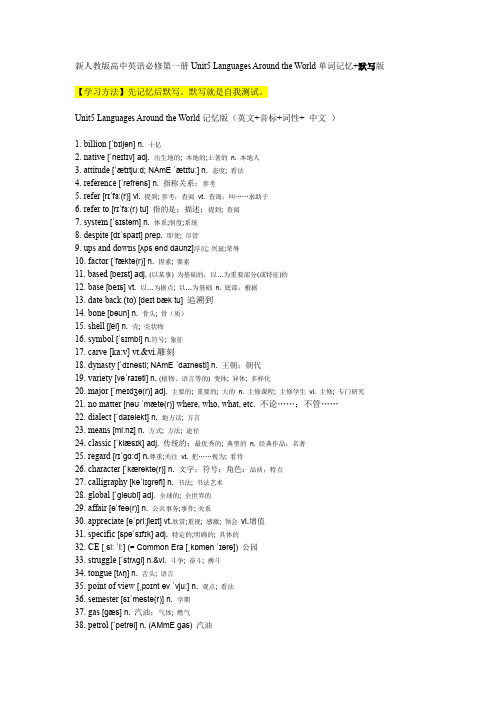
新人教版高中英语必修第一册Unit5 Languages Around the World单词记忆+默写版【学习方法】先记忆后默写。
默写就是自我测试。
Unit5 Languages Around the World记忆版(英文+音标+词性+ 中文)1. billion [ˈbɪljən] n. 十亿2. native [ˈneɪtɪv] adj. 出生地的; 本地的;土著的n. 本地人3. attitude [ˈætɪtjuːd; NAmE ˈætɪtuː] n. 态度; 看法4. reference [ˈrefrəns] n. 指称关系;参考5. refer [rɪˈfɜː(r)] vi.提到; 参考;查阅vt. 查询;叫……求助于6. refer to [rɪˈfɜː(r) tu]指的是;描述;提到; 查阅7. system [ˈsɪstəm] n. 体系;制度;系统8. despite [dɪˈspaɪt] prep. 即使; 尽管9. ups and downs [ʌps ənd daʊnz]浮沉; 兴衰;荣辱10. factor [ˈfæktə(r)] n. 因素; 要素11. based [beɪst] adj. (以某事) 为基础的;以…为重要部分(或特征)的12. base [beɪs] vt. 以…为据点; 以…为基础n. 底部;根据13. date back (to) [deɪt bæk tu] 追溯到14. bone [bəʊn] n. 骨头; 骨(质)15. shell [ʃel] n. 壳; 壳状物16. symbol [ˈsɪmbl] n.符号; 象征17. carve [ka:v] vt.&vi.雕刻18. dynasty [ˈdɪnəsti; NAmE ˈdaɪnəsti] n. 王朝;朝代19. variety [vəˈraɪəti] n. (植物、语言等的) 变体; 异体; 多样化20. major [ˈmeɪdʒə(r)] adj. 主要的; 重要的; 大的n. 主修课程; 主修学生vi. 主修; 专门研究21. no matter [nəʊˈmætə(r)] where, who, what, etc. 不论……;不管……22. dialect [ˈdaɪəlekt] n. 地方话; 方言23. means[miːnz] n. 方式; 方法; 途径24. classic [ˈklæsɪk] adj. 传统的;最优秀的; 典型的n. 经典作品;名著25. regard [rɪˈɡɑːd] n.尊重;关注vt. 把……视为; 看待26. character [ˈkærəktə(r)] n. 文字;符号;角色;品质;特点27. calligraphy [kəˈlɪɡrəfi] n. 书法; 书法艺术28. global [ˈɡləʊbl] adj. 全球的; 全世界的29. affair [əˈfeə(r)] n. 公共事务;事件; 关系30. appreciate [əˈpriːʃieɪt] vt.欣赏;重视; 感激; 领会vi.增值31. specific [spəˈsɪfɪk] adj. 特定的;明确的; 具体的32. CE [ˌsiː ˈiː] (= Common Era [ˌkɒmən ˈɪərə]) 公园33. struggle [ˈstrʌɡl] n.&vi. 斗争; 奋斗; 搏斗34. tongue [tʌŋ] n. 舌头; 语言35. point of view [ˌpɔɪnt əv ˈvjuː] n. 观点; 看法36. semester [sɪˈmestə(r)] n. 学期37. gas [ɡæs] n. 汽油;气体; 燃气38. petrol [ˈpetrəl] n. (AMmE gas) 汽油39. subway [ˈsʌbweɪ] n. (BrE underground [ˌʌndəˈɡraʊnd]) 地铁40. apartment [əˈpɑːtmənt] n. 公寓套房41. pants [pænts] n. [pl.] (BrE) 内裤; 短裤42. beg [beg] vt. 恳求; 祈求; 哀求43. equal [ˈiːkwəl] n. 同等的人; 相等物adj. 相同的,同样的44. gap [ɡæp] n. 间隔;开口; 差距45. demand [dɪˈmɑːnd] n. 要求; 需求vt. 强烈要求; 需要vi. 查问46. vocabulary [vəˈkæbjələri; vəˈkæbjəleri] n. 词汇47. description [dɪˈskrɪpʃn] n. 描写(文字); 形容48. relate [rɪˈleɪt] vt. 联系; 讲述49. relate to [rɪˈleɪt tu] 与……相关;涉及;谈到新人教版高中英语必修第一册Unit5 Languages Around the World单词默写版【学习方法】先记忆后默写。
2020秋新教材高中英语Unit5LanguagesaroundtheworldSectiomⅠ

vi.增值
Ⅱ.重点短语 1.refer ___to___指的是;描述;提到;查阅 2.be known ___fo_r___...因……而闻名 3.ups __a_n_d___ downs浮沉;兴衰;荣辱 4.__a_t___ the beginning起初 5.date back ___to___追溯到 6.lead ___to___导致
→___b_a_s_e__vt.以……为据点;以……为基础 n.底部;根据
→___b_a_s_ic___adj.基本的;基础的 9.___b_o_n_e__n.骨头;骨(质) 10.__sy_m__b_o_l___n.符号;象征 11.__c_ar_v_e____vt.& vi.雕刻
12.__d_y_n_a_s_ty____n.王朝;朝代 13.__v_a_r_ie_t_y____n.(植物、语言等的)变体;异体;多样化 →___v_a_r_i_o_u_s__ adj.不同的;各种各样的 →___v_a_r_y__vt.& vi.使不同;变化
2.What do you think is one of the main factors that has helped the Chinese language and culture survive?___A___
A.The Chinese writing system. B.Chinese wisdom. C.Hard work of the Chinese. D.The Chinese spoken language.
随着中国在全球事务中扮演着更为重要的角色,越来越多的国际学 生开始通过汉语这一奇妙的语言了解和欣赏中国的文化和历史。
Ⅳ.课文预读
Read the text (P62) and choose the best answers. 1.What does the text mainly tell us?___D___ A.The development of the Chinese writing system. B.The effect of the Chinese writing system. C.The important role of the Chinese writing system. D.The development and effect of the Chinese writing system.来自 课内要点探究重点单词
2020年新人教版高中英语必修一Unit5LanguagesAroundtheWorld单元教案
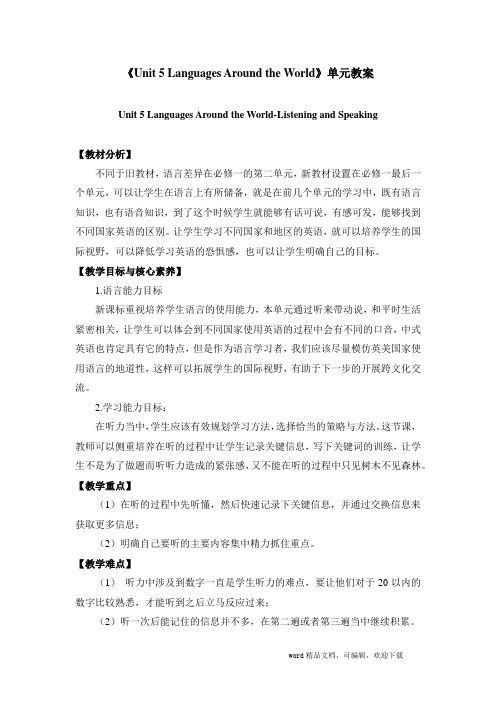
《Unit 5 Languages Around the World》单元教案Unit 5 Languages Around the World-Listening and Speaking【教材分析】不同于旧教材,语言差异在必修一的第二单元,新教材设置在必修一最后一个单元,可以让学生在语言上有所储备,就是在前几个单元的学习中,既有语言知识,也有语音知识,到了这个时候学生就能够有话可说,有感可发,能够找到不同国家英语的区别。
让学生学习不同国家和地区的英语,就可以培养学生的国际视野,可以降低学习英语的恐惧感,也可以让学生明确自己的目标。
【教学目标与核心素养】1.语言能力目标新课标重视培养学生语言的使用能力,本单元通过听来带动说,和平时生活紧密相关,让学生可以体会到不同国家使用英语的过程中会有不同的口音,中式英语也肯定具有它的特点,但是作为语言学习者,我们应该尽量模仿英美国家使用语言的地道性,这样可以拓展学生的国际视野,有助于下一步的开展跨文化交流。
2.学习能力目标:在听力当中,学生应该有效规划学习方法,选择恰当的策略与方法。
这节课,教师可以侧重培养在听的过程中让学生记录关键信息,写下关键词的训练,让学生不是为了做题而听听力造成的紧张感,又不能在听的过程中只见树木不见森林。
【教学重点】(1)在听的过程中先听懂,然后快速记录下关键信息,并通过交换信息来获取更多信息;(2)明确自己要听的主要内容集中精力抓住重点。
【教学难点】(1)听力中涉及到数字一直是学生听力的难点,要让他们对于20以内的数字比较熟悉,才能听到之后立马反应过来;(2)听一次后能记住的信息并不多,在第二遍或者第三遍当中继续积累。
【教学过程】Unit 5 Languages Around the World-Reading and Thinking【教材分析】本节课是高中英语第一册的最后一个单元的阅读和思考部分,文章难度明显增加,体现在以下几个方面:文章题材是说明文,比较难理解;话题生疏,涉及到历史等知识;生词量增大,而且在语境中理解词汇的要求提高。
- 1、下载文档前请自行甄别文档内容的完整性,平台不提供额外的编辑、内容补充、找答案等附加服务。
- 2、"仅部分预览"的文档,不可在线预览部分如存在完整性等问题,可反馈申请退款(可完整预览的文档不适用该条件!)。
- 3、如文档侵犯您的权益,请联系客服反馈,我们会尽快为您处理(人工客服工作时间:9:00-18:30)。
UNIT 5 Section Ⅱ请同学们认真完成 [练案22]一、语言基础训练Ⅰ.单句语法填空1.This is the classroom __where__ the old soldier is going to give us a speech.2.I’ll never forget the time __that/which/不填__ we spent together in the army camp.3.I’ll never forget the day __when__ I joined the League.4.I know the girl __whom__ the teacher talked with yesterday.5.She has two sons, both of __whom__ graduated from Harvard University.6.I still remember the day __when__ we met on the train for the first time.7.We visited the car factory __where__ my uncle once worked three years ago.8.There was a period of time in his childhood __when__ he liked listening to stories very much.9.Miss Liu is an excellent teacher from __whom__ I have learned a lot.10.The reason __why__ she changed her mind is quite clear.Ⅱ.用定语从句合并句子1.The house has been pulled down.He lived in the house 10 years ago.→The house __where/in which__ he lived 10 years ago has been pulled down.2.We settled down in a small village.In front of the village ran a winding river.→We settled down in a small village __in front of which__ ran a winding river.3.She has three sons.All of her sons are abroad now.→She has three sons, __all of whom__ are abroad now.4.There are sixty students in our class, Thirty of the students in our class are girls.→There are sixty students in our class, __thirty of whom__ are girls.5.The school lies in the east of the town.He once studied in the school.→The school __where/in which__ he once studied lies in the east of the town.Ⅲ.用定语从句完成句子1.The reason __why he could not go there__ was that he was ill in bed.他不能到那里去的原因是他卧病在床。
2.We are living in an age __when many things are done__ on the computer.我们生活在许多事情可以在电脑上做的时代。
3.After graduation he returned to the small town __where/in which he grew up__.毕业以后,他回到那个他长大的小镇上。
4.I’ll never forget the days __when I worked together with you__.我永远也不会忘记和你一起工作的日子。
5.I still remember the time __when I first traveled__ by plane.我仍然记得第一次坐飞机旅行的时候。
二、培优提升训练Ⅰ.阅读理解Foreign visitors to the UK might be disappointed when they learn that not everyone there speaks like Harry Potter and his ually,there’s an assumption by many non-Brits that everyone in Britain speaks with what’s known as a Received Pronunciation (RP,标准发音) accent,also called “the Queen’s English”.However,while many people do talk this way,most Britons speak in their own regional accents.Scouse,Glaswegian and Black Country—from Liverpool,Glasgow and the West Midlands—are just three of the countless non-RP accents that British people speak with.There are even differences in accents between towns or cities just 30 kilometers apart.What is even more disappointing is that not speaking in a RP accent may mean a British person is judged and even treated differently in their everyday life.In a 2015 study by The University of South Wales,videos of people reading a passage in three different UK accents were shown to a second group of people.The group then rated how intelligent they thought the readers sounded.The lowest-rated accent was Brummie,native to people from Birmingham,a city whose accent is considered working class.However,there is no need to be disappointed though you are not speaking in an RP accent.In fact,doing the opposite may even give you strength.Kong Seong-jae,25,is an Internet celebrity from Seoul.After studying in the UK,he picked up several regional accents.He’s now famous for his online videos,where he shows off the various accents he’s learned.“British people usually get really excited when I use some of their local dialect words,and they become much friendlier.I think it makes a bit of bond between local people and foreigners to speak in their local accent,” he said.So if you’re working on perfecting your British accent,try to speak like someone from Liverpool,Glasgow or Birmingham.You may not sound like Harry Potter,but youare likely to make more friends.文章大意:这是一篇说明文。
这篇文章先是提到了大多数人想让自己的英语发音更地道,就去学习标准发音,它向读者提供了一个反其道而行之的建议,就是去学习英国的一些地方方言,这样你可能会交到更多的朋友。
1.What can we infer from Paragraph 1?__A__A.Non-Brits usually hold that all Britons speak in a RP accent.B.Only “t he Queen’s English” is accepted in the UK.C.Foreign visitors are disappointed at their own spoken English.D.Any Received Pronunciation around the world is also called “the Queen’s English”.解析:细节理解题。
根据第一段第二句“Usually,there’s an assumption by many non -Brits that everyone in Britain speaks with what’s known as a Received Pronunciation (RP, 标准发音) accent,also called ’the Queen’s English’.”可知非英国人通常认为,所有的英国人都有标准口音。
